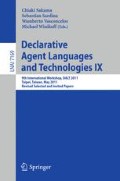Abstract
In open multi-agent systems, electronic institutions are used to form the interaction environment by defining social norms for group behaviour. However, as this paper shows, electronic institutions can be turned against agents to breach their security in a variety of ways. We focus our attention on probing attacks using electronic institutions specified in the Lightweight Coordination Calculus (LCC) language. LCC is a choreography language used to define electronic institutions in agent systems. A probing attack is an attack against the confidentiality of information systems. In this paper, we redefine the probing attack in conventional network security to be applicable in a multi-agent system domain, governed by electronic institutions. We introduce different probing attacks against LCC interaction models and suggest a secrecy analysis framework for these interactions. The proposed framework could be used to detect the possibility of certain probing attacks and to identify some forms of malicious electronic institutions.
Access this chapter
Tax calculation will be finalised at checkout
Purchases are for personal use only
Preview
Unable to display preview. Download preview PDF.
References
Artikis, A., Sergot, M., Pitt, J.: Specifying Norm-Governed Computational Societies. ACM Transactions on Computational Logic 10(1), 1–42 (2009)
Esteva, M., De La Cruz, D., Rosell, B., et al.: Engineering open multi-agent systems as electronic institutions. In: Procedings of the National Conference on Artificial Intelligence (AAA 2004), pp. 1010–1011. AAAI Press (2004)
Joseph, S., de Pinninck, A.P., Robertson, D., et al.: OpenKnowledge Deliverable 1.1: Interaction Model Language Definition (2006)
Robertson, D.: Multi-agent Coordination as Distributed Logic Programming. In: Demoen, B., Lifschitz, V. (eds.) ICLP 2004. LNCS, vol. 3132, pp. 416–430. Springer, Heidelberg (2004)
Robertson, D.: A Lightweight Coordination Calculus for Agent Systems. In: Leite, J., Omicini, A., Torroni, P., Yolum, p. (eds.) DALT 2004. LNCS (LNAI), vol. 3476, pp. 183–197. Springer, Heidelberg (2005)
Van’t Noordende, G.J., Overeinder, B.J., Timmer, R.J., et al.: Constructing secure mobile agent systems using the agent operating system. International Journal of Intelligent Information and Database Systems 3(4), 363–381 (2009)
Endsuleit, R., Wagner, A.: Possible attacks on and countermeasures for secure multi-agent computation. In: Arabnia, H.R., Aissi, S., Mun, Y. (eds.) SAM 2004, pp. 221–227. CSREA Press (2004)
Venkatesan, S., Chellappan, C.: Protection of Mobile Agent Platform through Attack Identification Scanner (AIS) by Malicious Identification Police (MIP). In: First International Conference on Emerging Trends in Engineering and Technology, pp. 1228–1231. IEEE (2008)
Bijani, S., Robertson, D.: A Review of Attacks and Security Approaches in Open Multi-agent Systems. Artificial Intelligence Review (2012)
Xiao, L., Lewis, P., Dasmahapatra, S.: Secure Interaction Models for the HealthAgents System. In: Harrison, M.D., Sujan, M.-A. (eds.) SAFECOMP 2008. LNCS, vol. 5219, pp. 167–180. Springer, Heidelberg (2008)
Xiao, L., Dasmahapatra, S., Lewis, P., et al.: The design and implementation of a novel security model for HealthAgents. Knowledge Engineering Review 26(2) (2011)
Hu, B., Dasmahapatra, S., Lewis, P., et al.: Facilitating Knowledge Management in Pervasive Health Care Systems. Networked Knowledge-Networked Media 221, 285–304 (2009)
Becker, M.Y.: Information Flow in Credential Systems. In: 23rd IEEE Computer Security Foundations Symposium (CSF), pp. 171–185. IEEE (2010)
Milner, R., Parrow, J., Walker, D.: A Calculus of Mobile Processes.1. Information and Computation 100(1), 1–40 (1992)
Anderson, R., Kuhn, M.: Tamper Resistance: A Cautionary Note. In: Proceedings of the Second USENIX Workshop on Electronic Commerce, vol. 2, pp. 1–11. USENIX Association (1996)
Zheng, J., Hu, M.-Z.: Intrusion Detection of DoS/DDoS and Probing Attacks for Web Services. In: Fan, W., Wu, Z., Yang, J. (eds.) WAIM 2005. LNCS, vol. 3739, pp. 333–344. Springer, Heidelberg (2005)
Ishai, Y., Sahai, A., Wagner, D.: Private Circuits: Securing Hardware against Probing Attacks. In: Boneh, D. (ed.) CRYPTO 2003. LNCS, vol. 2729, pp. 463–481. Springer, Heidelberg (2003)
Schmidt, J.-M., Kim, C.: A Probing Attack on AES. In: Chung, K.-I., Sohn, K., Yung, M. (eds.) WISA 2008. LNCS, vol. 5379, pp. 256–265. Springer, Heidelberg (2009)
Xu, S., Ni, Q., Bertino, E., et al.: A characterization of the problem of secure provenance management. In: IEEE International Conference on Intelligence and Security Informatics, ISI 2009, pp. 310–314. IEEE (2009)
Braun, U., Shinnar, A., Seltzer, M.: Securing provenance. In: Proceedings of the 3rd Conference on Hot Topics in Security, pp. 1–5. USENIX Association (2008)
Abian, J., Atencia, M., Besana, P., et al.: OpenKnowledge Deliverable 6.3: Bioinformatics Interaction Models (2008)
Siebes, R., Dupplaw, D., Kotoulas, S., et al.: The openknowledge system: an interaction-centered approach to knowledge sharing. In: Proceedings of the 15th International Conference on Cooperative Information Systems (CoopIS), pp. 381–390 (2007)
Gurevich, Y., Neeman, I.: DKAL: Distributed-knowledge authorization language. In: IEEE 21st Computer Security Foundations Symposium, CSF 2008, pp. 149–162. IEEE (2008)
Robertson, D., Barker, A., Besana, P., et al.: Models of interaction as a grounding for peer to peer knowledge sharing. In: Advances in Web Semantics I, pp. 81–129 (2009)
Bryans, J.W., Koutny, M., Mazare, L., et al.: Opacity generalised to transition systems. International Journal of Information Security 7(6), 421–435 (2008)
Kakas, A.C., Kowalski, R.A., Toni, F.: The Role of Abduction in Logic Programming. In: Gabbay, D.M., Hogger, C.J., Robinson, J.A. (eds.) Handbook of Logic in Artificial Intelligence and Logic Programming: Logic Programming 5, pp. 235–324. Oxford University Press, USA (1998)
Gorrieri, R., Martinelli, F., Matteucci, I.: Towards information flow properties for distributed systems. Electronic Notes in Theoretical Computer Science 236, 65–84 (2009)
Author information
Authors and Affiliations
Editor information
Editors and Affiliations
Rights and permissions
Copyright information
© 2012 Springer-Verlag Berlin Heidelberg
About this paper
Cite this paper
Bijani, S., Robertson, D., Aspinall, D. (2012). Probing Attacks on Multi-Agent Systems Using Electronic Institutions. In: Sakama, C., Sardina, S., Vasconcelos, W., Winikoff, M. (eds) Declarative Agent Languages and Technologies IX. DALT 2011. Lecture Notes in Computer Science(), vol 7169. Springer, Berlin, Heidelberg. https://doi.org/10.1007/978-3-642-29113-5_4
Download citation
DOI: https://doi.org/10.1007/978-3-642-29113-5_4
Publisher Name: Springer, Berlin, Heidelberg
Print ISBN: 978-3-642-29112-8
Online ISBN: 978-3-642-29113-5
eBook Packages: Computer ScienceComputer Science (R0)

